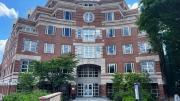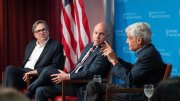On Thursday, the Harvard Kennedy School (HKS) announced a new program to educate military veterans and mid-career public servants. The American Service Fellowship, slated to begin in the fall of 2026, will fully fund a one-year master’s degree for at least 50 students. The pilot—currently chartered for one year—is the largest single-year scholarship program in HKS history.
The announcement comes at a tumultuous moment for the school. In late June, HKS laid off an undisclosed number of administrative and support staffers. The school has been particularly hard-hit by the Trump administration’s attacks on Harvard’s ability to host international students. Last year, 56 percent of its students were international, and nearly a quarter of the school’s revenue comes from tuition. And earlier this week, the University announced a continuation of its hiring freeze.
The new program is funded by “philanthropic donations raised specifically for this fellowship,” the school said in a press release, and it is a fleeting example of expansion during a time of contraction.
Public servants, too, have struggled this year. This year, the Trump administration fired at least 50,000 federal workers and is targeting the jobs of many others. In February, HKS Dean Jeremy Weinstein announced that the school would provide networking and coaching opportunities to support alumni impacted by cuts. The school also ran a campaign called “This Work Matters,” in which alumni in public service filmed videos explaining their work’s impact.
Throughout the fall, HKS will conduct nationwide outreach in hopes of soliciting applications from all 50 states. The school anticipates that the American Service Fellowship cohort will be made up of half military veterans and half public servants, with each individual having at least seven years of service. A Kennedy School spokesperson said that the program is designed to work within the school’s current physical and human footprint and will not require additional staff or faculty hiring.
“From our military to our government to our classrooms to our police stations, America’s public servants dedicate their lives to improving the lives of others,” said Weinstein in a press release. “In this moment of political division and major challenges in America, it's never been a more important time to invest in the next generation of public servants.”









